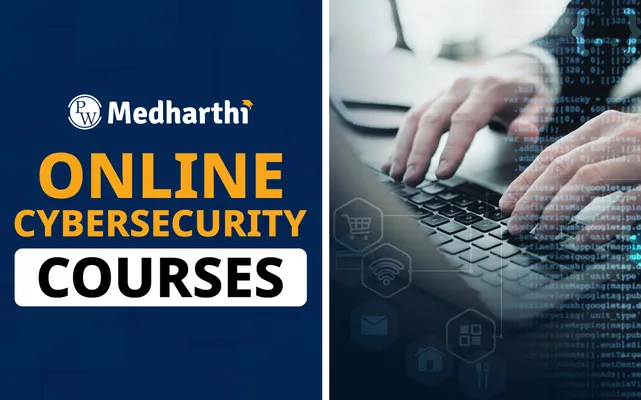
Online Cybersecurity Course: In this fast-paced and rapidly digitized world, the threats to cybersecurity have grown frequently. This has increased the need of the hour to implement robust security measures. For not only individuals but also organizations. Because one must understand that digital threats have risen, and it can simultaneously lead to a data breach. In addition to financial losses and reputational damage, which emphasizes on qualified professionals in this domain.
To tackle this, Online cybersecurity course offer a flexible and easily accessible pathway to build core competencies in cyber defense. Such courses provide the technical knowledge and certifications without needing to attend in person. These courses accommodate professionals, students, and career switchers. Therefore, to gain in-depth information related to the course and its offering, refer to the details mentioned below. We cover structure, benefits, features, and other important aspects.
In today’s tech-driven world, cybersecurity is more important than ever. It means protecting digital systems, networks, and sensitive data from hackers, mistakes, or unauthorized access. An online cybersecurity course teaches key topics like network security, encryption, endpoint protection, threat detection, and legal compliance. A strong cybersecurity plan works to find weaknesses, detect threats early, and take action to fix or prevent them.
These online courses help learners understand basic cybersecurity principles and tools. Students are introduced to important topics like threat modeling, ethical hacking, security policies, and how to respond to real-life cyberattacks. With this step-by-step learning, students build the skills to analyze risks and protect systems using methods used in the industry.
All the online cybersecurity course are structured in a way to organize content across beginner to advanced levels. All the levels that are set on the structure of the course are to correspond to popular certification paths and to provide a deeper level of security understanding.
| Structure of an Online Cybersecurity Course | ||
| Course Level | Focus Area | Target Audience |
| Foundation | Basic terminology, cyber hygiene, and digital safety | Beginners, students, early-career IT professionals |
| Intermediate | Network defense, Linux/Windows security, system hardening | IT support staff, system administrators |
| Advanced | Ethical hacking, penetration testing, forensics | Security analysts, incident responders |
| Specialist | Cloud security, SOC operations, threat hunting | Cybersecurity architects, cloud security roles |
Provided here is the eligibility criteria for enrolling in an online cybersecurity course that defines the requirements. Matching these eligibility criteria helps the learners in grasping the course information in much convenient way. So, refer to the details below to know about the online cybersecurity course eligibility criteria.
| Online Cybersecurity Course Eligibility Criteria | |
| Course Level | Eligibility Requirements |
| Foundation | No prior experience required; suitable for all academic and professional backgrounds |
| Intermediate | Basic understanding of IT systems and familiarity with Windows/Linux environments |
| Advanced | Prior IT experience and completion of intermediate coursework or certification recommended |
| Specialist | Several years of professional experience in cybersecurity or related domains preferred |
Listed below are some of the salient features of Online Cybersecurity course that students must be aware of. Being aware of such features will enable them to extract the best output from the provided cybersecurity course.
Independent Modules or Timed Labs: Students can choose between flexible self-paced modules or scheduled live lab sessions. Both options cater to different learning styles and provide quick access to instructor support and hands-on practice in simulated environments.
Interactive Online Labs: These labs offer a safe, browser-based space where students can practice using security tools, setting up firewalls, and analyzing malware. This hands-on experience is key to learning real-world cybersecurity skills.
Tests and Practice Assessments: Regular quizzes and mock exams help students track their progress, reinforce learning, and identify areas for improvement. These tools also prepare learners for official certification exams.
Real-World Application: Courses use real case studies, like ransomware attacks or data breaches, to show how cybersecurity concepts are used in real life. This helps students apply what they’ve learned and make better decisions under pressure.
Completion Certificate and Exam Prep: After finishing the course, students usually receive a certificate. Many programs also include study guides, practice tests, and exam-focused resources to help learners earn professional certifications.
Covered below are some of the benefits of the Online Cybersecurity course that candidates can extract for themselves. So, to learn about some of the benefits read the below mentioned points to acquire information.
Flexible Schedule: An online cybersecurity course lets students access learning materials anytime. This flexibility helps working professionals and busy students fit training into their daily routines without disrupting work or school.
Step-by-Step Learning: Students start with the basics and move on to more advanced topics. This structure supports beginners while also helping experienced learners build skills for higher-level cybersecurity jobs.
Practical Skills Training: Online labs and simulations give students hands-on experience with tools like firewalls, packet analyzers, and intrusion detection systems. These sessions help build real-world skills needed to spot and stop cyber threats.
Better Job Opportunities: Getting certified through an online cybersecurity course can open doors to roles like SOC engineer, threat analyst, or security auditor. The skills taught match what employers in government and private companies are looking for.
Updated Course Content: Since cybersecurity changes quickly, many online courses are updated often. This keeps students informed about new threats, laws, and security practices, so their knowledge stays current and useful.
| Online Degree Important Links | |
| Online MCA Programs in India | Online BCom Course |
| Online MCA Course | Online Degree Programs |
| Regular Degree Vs Distance Degree | Online BA Course |
